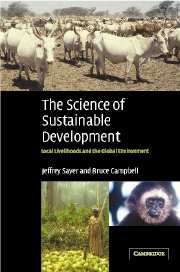Book contents
- Frontmatter
- Contents
- List of figures
- List of boxes
- List of tables
- Foreword
- Preface
- Acknowledgements
- Part I Integrating natural resource management
- Part II Realities on the ground
- Part III The research–management continuum
- 9 The spread of innovations
- 10 Measuring the performance of natural resource systems
- 11 Achieving research-based management
- Bibliography
- Index
10 - Measuring the performance of natural resource systems
Published online by Cambridge University Press: 18 May 2010
- Frontmatter
- Contents
- List of figures
- List of boxes
- List of tables
- Foreword
- Preface
- Acknowledgements
- Part I Integrating natural resource management
- Part II Realities on the ground
- Part III The research–management continuum
- 9 The spread of innovations
- 10 Measuring the performance of natural resource systems
- 11 Achieving research-based management
- Bibliography
- Index
Summary
Researchers have finite resources and will seek to allocate these most efficiently. Therefore, they need to identify and assess priorities for research, monitor the progress of on-going research and evaluate the impacts of completed research. This is a difficult enough process in highly focussed technological research projects, but it is even more of a challenge for complex natural resource systems. The scale and complexity of assessment expands with the complexity of the system. Impact assessment for natural resources research requires quite different approaches to those used for technology improvement research. In this chapter we argue for a different vision of the role and nature of impact assessment. We suggest that impact assessment should be an integral feature of natural resources research. We show how various approaches to impact assessment can be fundamental tools for adaptation, learning and performance enhancement, providing data for further negotiation amongst stakeholders as well as for resource allocation decisions.
Our review of approaches to impact assessment in natural resources research has a major implications for the way such research is organised. It strengthens the case for viewing research and management as part of a continuum with effective flows of information and ideas along a chain from the ‘hi-tech’ laboratory to the resource manager (Chapter 11). We find the ideas of Roussel and colleagues on Third Generation R&D very relevant to the natural resource management situation.
Information
- Type
- Chapter
- Information
- The Science of Sustainable DevelopmentLocal Livelihoods and the Global Environment, pp. 211 - 225Publisher: Cambridge University PressPrint publication year: 2003
